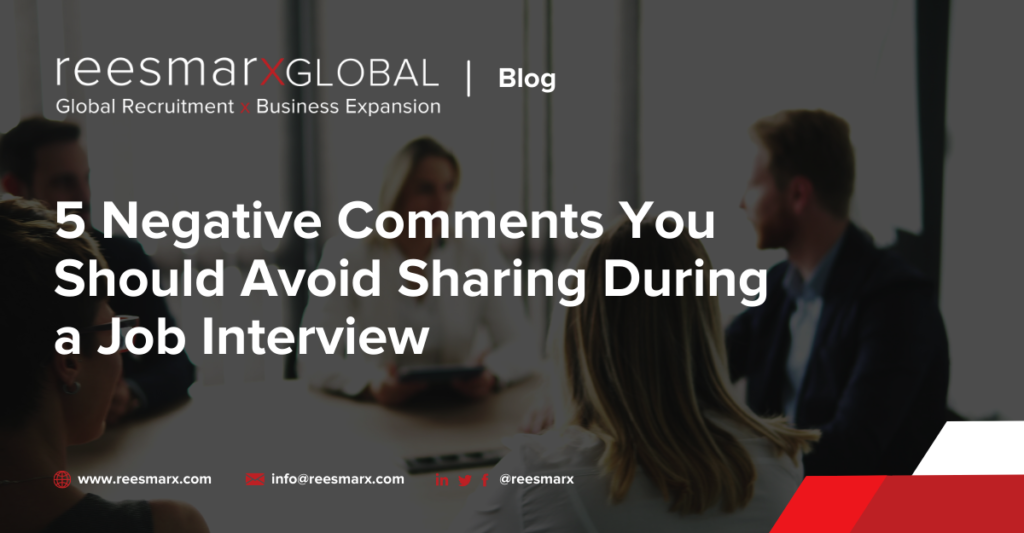A professional recruiter will help a candidate feel relaxed and enjoy the interview process. It is not meant to be an interrogative experience, but rather an opportunity to see if there is a quality match in expertise, soft skills, performance orientation and expectation of work environment, between both the candidate and the employer.
What you say and disclose during your first interview can help you proceed to subsequent steps in the hiring process or bring your eligibility to a full-stop. We spoke to some of our international recruiters, to gather a list of the top five disqualifying or concerning comments that they hear shared by candidates during the interview process.
1. “I’m actually looking for a job in a different field.”
It may surprise you that this statement happens during interviews quite frequently. It is an honest disclosure. But when a potential hire shares that the job they are applying for isn’t really aligned with their career goals, industry or the role that they really want to be employed in, the natural response for a professional recruiter is to disqualify the candidate almost immediately (regardless of credentials, experience or performance during the interview).
Organizations retain recruiters to help them find the best and most qualified candidates. The cost of hiring and onboarding (training) a new employee during the first year is quite expensive for employers. Our recruiters at reesmarx help identify top-performing candidates, who are likely to remain with the organization and add value over several years of service. Retention matters to employers, who want professionals to grow and contribute tenure within the organization.
This statement implies that when a suitable job (in the field that the candidate has targeted) becomes available, they will leave. That the current career opportunity is transitional or a stepping-stone to the job that they really want. And unless the hiring employer is looking for a short-term contributor (few are), the candidate represents a risky hire, without intent to stay with the organization.
2. “I hated my last manager, and that’s why I quit.”
Hate is a strong word. We know that it is impossible to have completely positive and productive relationships with every single person you work with, for the duration of your career. Interpersonal conflicts occur; some are related to corporate culture, the team dynamic, high-stress work environments and other causes.
Should you share that you had (or currently have) conflict with your manager or members of your team? If you have been rated favorably on your performance evaluations, and the conflict is systemic (within the department and involving more than one employee) you can explain the circumstances to the recruiter. You will, after all, be asked about your reason for leaving your current employer.
Be forthcoming about the elements of the work environment that we’re not a good fit for your needs, work style and personality. Keep it positive and respectful and avoid disparaging other employees or your manager(s). Focus on the aspects of the workplace culture that are missing, and what you are looking for that will be a better match for you.
3. “I am really just looking for a job with good health benefits.”
This is another honest disclosure that is understandable, particularly if you have been employed with an organization that does not offer healthcare benefits. Whether you are single or have a family, these benefits matter and are definitely a priority in your job search and a perk that you will appreciate as an employee.
There are two causes of concern when a recruiter hears this statement in a job interview. It may imply that the candidate is only interested in the job because of the health benefits or insurance coverage. Does that mean that the employer will be hiring someone who doesn’t care about the organization (or their performance), as long as they acquire the healthcare benefits they need?
Employers want their employees to excel, and to enjoy their work. Happy employees are productive employees, and health insurance coverage is one valuable way that employers give-back to their staff. But if the only reason you want the job is to qualify for benefits, it is not the right career opportunity for you.
4. “How long does it take to qualify for vacation and paid time off?”
A professional who is excited about a new career opportunity will be eager to get started in a new role. They will be anticipating the onboarding, meeting new team members, and establishing a relationship with the management team. The candidate will also be focused on making a solid impression during the probationary period after they are hired.
Those are some of the traits and hallmarks of a productive employee, and someone who is prepared to invest themselves in a new career opportunity. Naturally, we all appreciate our vacation time and look forward to it, and favor employment opportunities that provide that valuable time off. But if a candidate is highly focused on how much time off, they will receive, and how quickly they can schedule paid vacation days, it inadvertently conveys a less productive personal work ethic.
When you consider that many employers adopt a policy of one-year of service prior to the provision of paid vacation time, the priority for new hires should be integrating into the organization and team and focusing on performance, not counting down to their first vacation day.
5. “Why did the last person leave this job?”
A recruiter understands the risk that professionals are taking when they are pursuing new career opportunities. Not every employment experience is a positive one, and if a qualified candidate has had a particularly negative experience with their current employer, they are likely to be very cautious. They do not want to find themselves in another unsuitable corporate culture, or toxic work environment.
The intention of the question is honest and sincere. However, it presents several red flags for the interviewer. First, it inadvertently implies that the candidate has had interpersonal issues with previous employment opportunities and that the interviewee may be prone to conflict with co-workers or management. Second, it may hint at a sensitivity or degree of defensiveness that the candidate may be feeling (due to negative previous experiences) that may make the candidate more prone to defensive behaviors.
The job of the recruiter is not only to identify the best candidate for the role in terms of qualifications and experience but to observe personality traits that align with the corporate culture and team dynamic. If the role was not a ‘good fit’ for the previous employee, that does not mean the same issues will occur with a new hire. But apprehensive responses from a potential candidate can be a sign that they may be more prone to conflict in the workplace.
The intention of any professional recruiter is to find the perfect match for the employer, and for the candidate, for successful long-term tenure and growth. When you are preparing yourself for an interview, draft a list of questions that the recruiter may ask you about your work history, personal skills, strengths, and weaknesses.
Practice questions before your interview, so that you can be forthcoming, but also state your answers to avoid any statements that may limit your candidacy for the role.






